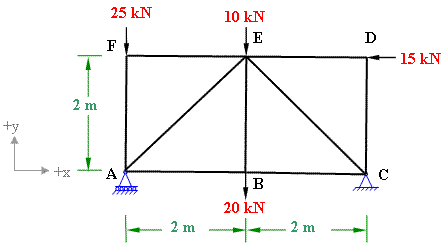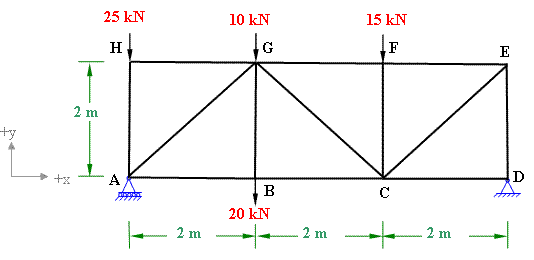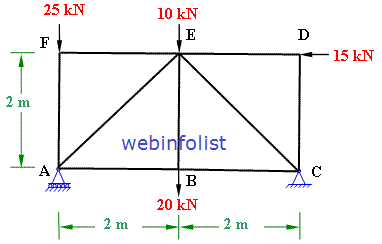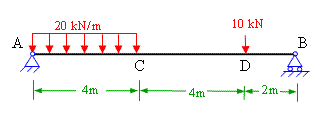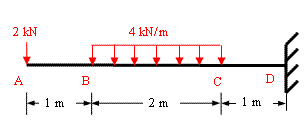Truss is a structure comprising straight members forming one or more triangular units. The members of the truss are connected at the ends usually by pin-joints. The joint of a truss are commonly known as nodes. External forces and reactions are considered to act only at the nodes and result in forces in the members which are only axial forces (tensile or compressive).
When all the members and nodes lie within a two dimensional plane, it is known as plane truss, whereas a truss having members and nodes extending into three dimensions is known as space truss.
Trusses are used in many structures like bridges, roof supports, transmission towers, space stations etc. Different types of simple plane truss like Warren truss, Pratt truss, Howe truss, roof truss etc are shown in figure 2-1
Truss can be termed as;
(a) statically determinate; all the unknown forces (support reaction and member forces) can be determined by applying equations of static equilibrium. if m + r = 2j,
(b) indeterminate; equations of static equilibrium are not sufficient to determine unknown forces, if m+r > 2j,
(c) unstable; not suitable to carry load; if m+r < 2j;
Where m = number of members in a truss;
r = number of reaction components;
j = number of joints in a truss;
Figure 2-1
Methods of Analysis
There are two methods for solving for the forces in the members of a truss;
(i) Method of Joints: In this methods we consider the equilibrium of the all the joints of the truss. Only two equations of static equilibrium, Σ Fx and Σ Fy. Therefore it is very important in this method that we should start with the joint having not more than 2 unknown forces. see problem 3-1
(ii) Method of sections: This method is used when the forces in a few members are to be determined. In this method an imaginary section is passed through the members in which the force is to be determined and then consider the equilibrium of the left hand side or the right hand side of the truss to find unknown forces. see problem 3-2
For more civil engineering solved problems please visit our Problem Solver
You can visit the following links of solved examples
Other Solved examples
More Solved Examples
regularly updated
Excellent Calculators
Stress Transformation Calculator
Calculate Principal Stress, Maximum shear stress and the their planes
Calculator for Moving Load Analysis
To determine Absolute Max. B.M. due to moving loads.
Bending Moment Calculator
Calculate bending moment & shear force for simply supported beam
Moment of Inertia Calculator
Calculate moment of inertia of plane sections e.g. channel, angle, tee etc.
Reinforced Concrete Calculator
Calculate the strength of Reinforced concrete beam
Moment Distribution Calculator
Solving indeterminate beams
Deflection & Slope Calculator
Calculate deflection and slope of simply supported beam for many load cases
Fixed Beam Calculator
Calculation tool for beanding moment and shear force for Fixed Beam for many load cases
BM & SF Calculator for Cantilever
Calculate SF & BM for Cantilever
Deflection & Slope Calculator for Cantilever
For many load cases of Cantilever
Overhanging beam calculator
For SF & BM of many load cases of overhanging beam
More Links
Civil Engineering Quiz
Test your knowledge on different topics of Civil Engineering
Research Papers
Research Papers, Thesis and Dissertation
List of skyscrapers of the world
Contining Tall building worldwide
Forthcoming conferences
Contining List of civil engineering conferences, seminar and workshops
Profile of Civil Engineers
Get to know about distinguished Civil Engineers
Professional Societies
Worldwide Civil Engineers Professional Societies
Keep visiting for getting updated or Join our mailing list
Search our website for more...
PleaseTell your Friends about us if you find our website useful
Other Useful Links
